+ Open data
Open data
- Basic information
Basic information
| Entry | Database: PDB / ID: 6uqe | ||||||
|---|---|---|---|---|---|---|---|
| Title | ClpA/ClpP Disengaged State bound to RepA-GFP | ||||||
 Components Components |
| ||||||
 Keywords Keywords | CHAPERONE / AAA+ / Protease / Hsp100 / ATPase | ||||||
| Function / homology |  Function and homology information Function and homology informationHslUV protease complex / endopeptidase Clp / endopeptidase Clp complex / positive regulation of programmed cell death / response to temperature stimulus / ATP-dependent peptidase activity / protein quality control for misfolded or incompletely synthesized proteins / protein unfolding / proteasomal protein catabolic process / serine-type peptidase activity ...HslUV protease complex / endopeptidase Clp / endopeptidase Clp complex / positive regulation of programmed cell death / response to temperature stimulus / ATP-dependent peptidase activity / protein quality control for misfolded or incompletely synthesized proteins / protein unfolding / proteasomal protein catabolic process / serine-type peptidase activity / response to radiation / cellular response to heat / response to heat / ATPase binding / response to oxidative stress / serine-type endopeptidase activity / ATP hydrolysis activity / proteolysis / ATP binding / identical protein binding / membrane / cytoplasm / cytosol Similarity search - Function | ||||||
| Biological species |  unidentified (others) | ||||||
| Method | ELECTRON MICROSCOPY / single particle reconstruction / cryo EM / Resolution: 3 Å | ||||||
 Authors Authors | Lopez, K.L. / Rizo, A.R. / Southworth, D.R. | ||||||
| Funding support |  United States, 1items United States, 1items
| ||||||
 Citation Citation |  Journal: Nat Struct Mol Biol / Year: 2020 Journal: Nat Struct Mol Biol / Year: 2020Title: Conformational plasticity of the ClpAP AAA+ protease couples protein unfolding and proteolysis. Authors: Kyle E Lopez / Alexandrea N Rizo / Eric Tse / JiaBei Lin / Nathaniel W Scull / Aye C Thwin / Aaron L Lucius / James Shorter / Daniel R Southworth /  Abstract: The ClpAP complex is a conserved bacterial protease that unfolds and degrades proteins targeted for destruction. The ClpA double-ring hexamer powers substrate unfolding and translocation into the ...The ClpAP complex is a conserved bacterial protease that unfolds and degrades proteins targeted for destruction. The ClpA double-ring hexamer powers substrate unfolding and translocation into the ClpP proteolytic chamber. Here, we determined high-resolution structures of wild-type Escherichia coli ClpAP undergoing active substrate unfolding and proteolysis. A spiral of pore loop-substrate contacts spans both ClpA AAA+ domains. Protomers at the spiral seam undergo nucleotide-specific rearrangements, supporting substrate translocation. IGL loops extend flexibly to bind the planar, heptameric ClpP surface with the empty, symmetry-mismatched IGL pocket maintained at the seam. Three different structures identify a binding-pocket switch by the IGL loop of the lowest positioned protomer, involving release and re-engagement with the clockwise pocket. This switch is coupled to a ClpA rotation and a network of conformational changes across the seam, suggesting that ClpA can rotate around the ClpP apical surface during processive steps of translocation and proteolysis. | ||||||
| History |
|
- Structure visualization
Structure visualization
| Movie |
 Movie viewer Movie viewer |
|---|---|
| Structure viewer | Molecule:  Molmil Molmil Jmol/JSmol Jmol/JSmol |
- Downloads & links
Downloads & links
- Download
Download
| PDBx/mmCIF format |  6uqe.cif.gz 6uqe.cif.gz | 1016 KB | Display |  PDBx/mmCIF format PDBx/mmCIF format |
|---|---|---|---|---|
| PDB format |  pdb6uqe.ent.gz pdb6uqe.ent.gz | 838.3 KB | Display |  PDB format PDB format |
| PDBx/mmJSON format |  6uqe.json.gz 6uqe.json.gz | Tree view |  PDBx/mmJSON format PDBx/mmJSON format | |
| Others |  Other downloads Other downloads |
-Validation report
| Arichive directory |  https://data.pdbj.org/pub/pdb/validation_reports/uq/6uqe https://data.pdbj.org/pub/pdb/validation_reports/uq/6uqe ftp://data.pdbj.org/pub/pdb/validation_reports/uq/6uqe ftp://data.pdbj.org/pub/pdb/validation_reports/uq/6uqe | HTTPS FTP |
|---|
-Related structure data
| Related structure data |  20845MC  6uqoC  6w1zC  6w20C  6w21C  6w22C  6w23C  6w24C M: map data used to model this data C: citing same article ( |
|---|---|
| Similar structure data |
- Links
Links
- Assembly
Assembly
| Deposited unit | 
|
|---|---|
| 1 |
|
- Components
Components
-ATP-dependent Clp protease ... , 2 types, 20 molecules ABCDEFGHIJKLMNOPQRST
| #1: Protein | Mass: 64204.504 Da / Num. of mol.: 6 Source method: isolated from a genetically manipulated source Source: (gene. exp.)   #2: Protein | Mass: 21472.762 Da / Num. of mol.: 14 Source method: isolated from a genetically manipulated source Source: (gene. exp.)   References: UniProt: A0A0K4NM46, UniProt: P0A6G7*PLUS, endopeptidase Clp |
|---|
-Protein/peptide , 2 types, 2 molecules XY
| #3: Protein/peptide | Mass: 869.063 Da / Num. of mol.: 1 Source method: isolated from a genetically manipulated source Source: (gene. exp.) unidentified (others) / Production host:  |
|---|---|
| #4: Protein/peptide | Mass: 954.168 Da / Num. of mol.: 1 Source method: isolated from a genetically manipulated source Source: (gene. exp.) unidentified (others) / Production host:  |
-Non-polymers , 2 types, 12 molecules 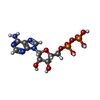
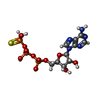

| #5: Chemical | ChemComp-ADP / #6: Chemical | ChemComp-AGS / |
|---|
-Details
| Has ligand of interest | N |
|---|---|
| Has protein modification | N |
-Experimental details
-Experiment
| Experiment | Method: ELECTRON MICROSCOPY |
|---|---|
| EM experiment | Aggregation state: PARTICLE / 3D reconstruction method: single particle reconstruction |
- Sample preparation
Sample preparation
| Component | Name: ClpAP / Type: COMPLEX / Entity ID: #1-#4 / Source: RECOMBINANT |
|---|---|
| Molecular weight | Value: 0.84 MDa / Experimental value: NO |
| Source (natural) | Organism:  |
| Source (recombinant) | Organism:  |
| Buffer solution | pH: 7.5 |
| Specimen | Embedding applied: NO / Shadowing applied: NO / Staining applied: NO / Vitrification applied: YES |
| Vitrification | Cryogen name: ETHANE |
- Electron microscopy imaging
Electron microscopy imaging
| Experimental equipment |  Model: Titan Krios / Image courtesy: FEI Company |
|---|---|
| Microscopy | Model: FEI TITAN KRIOS |
| Electron gun | Electron source:  FIELD EMISSION GUN / Accelerating voltage: 300 kV / Illumination mode: FLOOD BEAM FIELD EMISSION GUN / Accelerating voltage: 300 kV / Illumination mode: FLOOD BEAM |
| Electron lens | Mode: BRIGHT FIELD / Nominal magnification: 105000 X / Calibrated magnification: 58616 X / Nominal defocus max: 2000 nm / Nominal defocus min: 1000 nm / Cs: 2.7 mm / C2 aperture diameter: 70 µm |
| Specimen holder | Cryogen: NITROGEN / Specimen holder model: FEI TITAN KRIOS AUTOGRID HOLDER |
| Image recording | Average exposure time: 6 sec. / Electron dose: 69 e/Å2 / Film or detector model: GATAN K3 BIOQUANTUM (6k x 4k) |
| Image scans | Width: 11520 / Height: 8184 |
- Processing
Processing
| EM software | Name: cryoSPARC / Version: 2 / Category: 3D reconstruction |
|---|---|
| CTF correction | Type: PHASE FLIPPING AND AMPLITUDE CORRECTION |
| Symmetry | Point symmetry: C1 (asymmetric) |
| 3D reconstruction | Resolution: 3 Å / Resolution method: FSC 0.143 CUT-OFF / Num. of particles: 169000 / Symmetry type: POINT |
 Movie
Movie Controller
Controller











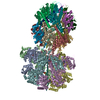
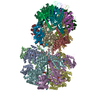
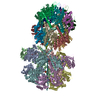
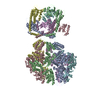



 PDBj
PDBj





